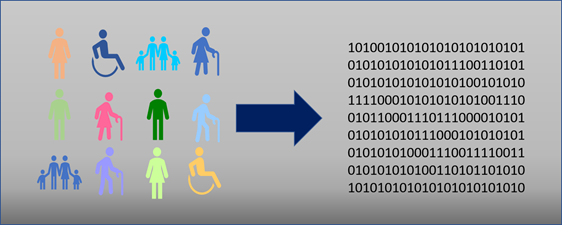People is Data

Society throughout history has gone through a number of key changes, each of which has brought new possibilities and challenges. The industrial age brought with it the wonder of increased production that came with mechanisation, and with that came challenges of closer living and pollution. While we talk about the technology or information age, we are now headed into the data age. We collect and record data at an unprecedented rate, with an unparalleled capability to share. Millennial culture and social media platforms mean that this is truly the data driven age.
If we are to see examples of the world around us, the adverts we see on web browsers are based on the insights into our own browsing history, digital signs change content based on ages and genders of those around. Gucci as an example have taken stores into this to a digitally enabled data driven world that mirrors the users requirements. So you may be asking yourself why this preamble?
If we start with the grammatically poor but accurate statement that “People is Data” we perhaps should consider giving a second or even third thought to how we handle and use data (or people as we should perhaps think of it).
Key ethical principles of transparency, fairness, privacy and accountability have a need to not only be introduced but to also be ubiquitously upheld, not just by ourselves but by those we commission to undertake activities on our behalf. As we move into a world of Data Insight driven care and medicine we need to ask ourselves are we upholding those key ethical principles. Now this might at first point sound like a ‘high brow’ conversation about the ethics of Artificial Intelligence, we would however argue that the world of automation, lo-code or no-code systems means that the ability to access and analyse data is unparalleled. Without appropriate and proportionate checks and balances in place we run the risk of a Cambridge Analytica style event taking place.
We have for over 2000 years asked those that provide care for us to sign up to a higher code of conduct than the law mandates. In this, the Data Age should we not ask those informing those that directly care for us to do the same. From receptionist to data scientist, nurse to manager, we all have a responsibility. The Digital Ethics Charter is a first step on the road for those that use or touch care data to adopt an oath similar to the Geneva Declaration (formerly Hippocratic Oath) for how they work. The second step that we should take is to urge our organisations and those organisations we contract with to consider the questions of ethics and to commit to consider ethics in their endeavours.

Ciaron Hoye, Deputy CIO, NHS Birmingham & Solihull CCG
Kate Walker, Digital Programme Director Suffolk & North East Essex ICS